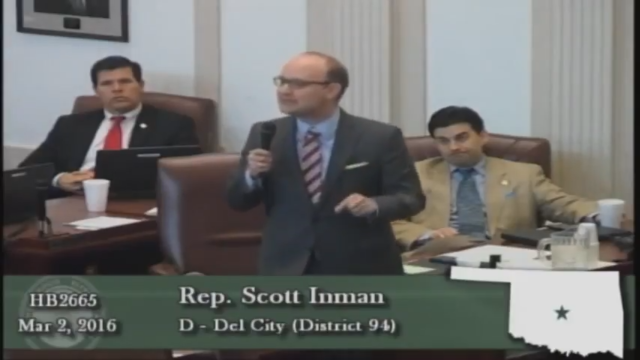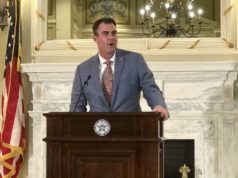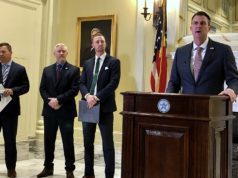
As the 2016 Oklahoma legislative session advances, the Republican-controlled House has advanced at least two bills of note so far.
HB 2665: Low-income Oklahomans face loss of health coverage

The first involves the potential elimination of 111,000 people from SoonerCare, Oklahoma’s version of Medicaid. HB 2665, by Rep. Doug Cox (R-Grove), seeks to address the state’s budget shortfall through a paring down of eligibility. It would remove 111,000 current recipients if they are under 65, single parents of at least one dependent child, not pregnant, and qualified as non-disabled. About 77,000 (69 percent) of those who would be affected are women, and all of those affected currently earn less than $9,500 annually.
If enacted, the bill would request a waiver from the federal government to exclude those who qualify for elimination of coverage under Cox’s proposed rubric. Although such a reduction in coverage would save the state an estimated $130 million annually, $203 million in federal-matching funds wound no longer flow through the Oklahoma Healthcare Authority and into the businesses of Oklahoma medical professionals.
Should the state fail to obtain the federal waiver but cut eligible Oklahomans from SoonerCare anyway, the state’s entire Medicaid program could be in jeopardy, thereby putting up to $3 billion in annual federal funds at risk of being revoked, according to a Tulsa World report.
In late February, House Minority Leader Rep. Scott Inman (D-Del City) characterized the bill as “immoral” and “the complete opposite of the Oklahoma Standard,” as reported by Public Radio Tulsa. Wednesday in the House, Inman delivered an impassioned argument against HB 2665, presented in full below (preacher mode engaged at 2:07):
The bill passed Wednesday in the House, 65 to 34, as four Republicans — John Bennett (Sallisaw), Tommy Harden (Madill), John Montgomery (Lawton) and Justin Wood (Shawnee) — crossed party lines to join unanimous Democratic opposition. Click here for the full voting record of HB 2665.
Of course, legislators find themselves advancing this decision after Oklahoma leadership also denied expansion of Medicaid coverage as proposed under the federal government’s Affordable Care Act (commonly referred to as Obamacare). OKPolicy.org estimated potential savings between $446 million and $485 million as part of its five-part recommendation for addressing the current revenue failure.
HB 2797: Abortion education, not sex education

Also Wednesday, the House passed a proposal by Rep. Ann Coody (R-Lawton) to create the Humanity of the Unborn Child Act. Under the proposed legislation, school curricula would include the creation of anti-abortion messages and promotional materials to be distributed in high schools and paid for by a revolving fund used only and specifically for that purpose.
Opposition to the bill included proposed amendments from Rep. Emily Virgin (D-Norman) and Rep. Jason Dunnington (D-OKC) to include provisions for sex education and contraception education, respectively. Both were tabled.
“I hear you say this has nothing to do with sex education. But children who are in the womb are there because people have sex. It doesn’t make sense not to include that,” said Dunnington, as quoted in the Tulsa World.
It passed the House Wednesday by a vote of 64 to 12. Click here for a full record of the vote.
To hell in a hand-in-handbasket
Although seemingly unrelated, these two bills actually go hand in hand, as perhaps best summarized by Reddit commenter Pourdigy in the r/Oklahoma subreddit:
Brainwash the mother into giving birth under unsustainable economic circumstances, then stab her in the back for doing so.
Damn that’s cold. Is there a secret cabal of super villain legislators thinking this stuff up or what?
The Senate is scheduled to begin work on House bills the week of March 14. Those bills will have to be heard in committee by April 7, and then would have until April 21 to be considered by the Senate in full.
In the meantime, if you would like to express your opinion about these proposed bills or any other issues, you may contact your relevant elected officials using this search tool.





















